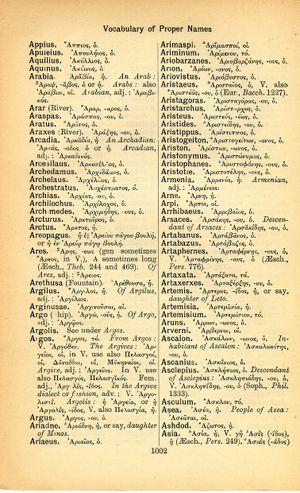Artemisia: Difference between revisions
From LSJ
τῶν δ᾽ ὀρθουμένων σῴζει τὰ πολλὰ σώμαθ᾽ ἡ πειθαρχία → But of those who make it through, following orders is what saves most of their lives (Sophocles, Antigone 675f.)
(1) |
m (Text replacement - "(|thumb)\n(\|link=)" to "$1$2") |
||
| Line 1: | Line 1: | ||
{{WoodhouseENELnames | {{WoodhouseENELnames | ||
|Text=[[File:woodhouse_1002.jpg|thumb | |Text=[[File:woodhouse_1002.jpg|thumb|link={{filepath:woodhouse_1002.jpg}}]]Ἀρτεμισία, ἡ. | ||
|link={{filepath:woodhouse_1002.jpg}}]]Ἀρτεμισία, ἡ. | |||
}} | }} | ||
{{Lewis | {{Lewis | ||
Revision as of 16:48, 18 May 2020
English > Greek (Woodhouse)
Ἀρτεμισία, ἡ.
Latin > English (Lewis & Short)
Artĕmĭsĭa: ae, f., = Ἄρτεμισία.
I Wife of King Mausolus, in Caria, to whom, after his death, she built the renowned Mausoleum, Gell. 10, 18.—
II artĕmĭsĭa, ae, f., the plant mugwort, Plin. 25, 7, 36, § 73; App. Herb. 10.
Latin > French (Gaffiot 2016)
(2) Artĕmīsĭa, æ, f.,
1 Artémise [femme de Mausole, reine de Carie] : Cic. Tusc. 3, 75 ; Gell. 10, 18, 1
2 île de la mer Tyrrhénienne : Plin. 3, 81.
Latin > German (Georges)
(1) Artemīsia1, ae, f. (Ἀρτεμισία), Königin in Karien, die ihrem Gemahl Mausolus ein prächtiges Grabmal errichtete, Gell. 10, 18, 3 sqq.; vgl. Cic. Tusc. 3, 75. Val. Max. 4, 6. ext. 1.

